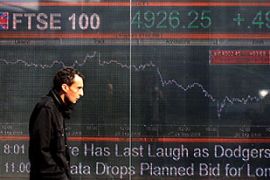Stocks mixed in US vote run-up
European and Asian markets remain volatile as rescue package’s fate hangs in the balance.

In an attempt to ease pressure on the Nikkei, the Bank of Japan injected 800 billion yen ($7.6bn) into the market, the 13th straight business day it has done so.
Seoul and Shanghai were shut for public holidays. Taipei recovered from earlier losses to post a 0.7 per cent gain.
Dealers took their cue from Wall Street, where the Dow Jones Industrial Average sank 3.22 per cent to a three-year low on Thursday.
European caution
Against this backdrop of market volatility, world financial leaders cautioned that the rescue plan may not be enough to revive the global economy.
Jean-Claude Trichet, the European Central Bank chief, said the measure was no guaranteed panacea.
“In America … as in Europe and the rest of the world, we have to face up to the major correction that is under way” on financial markets, he told a French radio station on Friday.
“So we cannot say that after such and such an action, it is all over.”
| Global credit crisis |
|
Hong Kong mulls financial measures |
Trichet declined to label France and the eurozone’s economic slowdown a recession, despite forecasts to that effect.
“ECB experts tell us that we have slowing growth,” he said.
“I will not use any word other than that – slowing growth with significant risks that growth may become even weaker.”
But Trichet stressed that the US rescue bill must be passed.
Earlier Nicolas Sarkozy, the French president, announced that he is to hold a European financial summit to discuss the global crisis in Paris on Saturday.
Those attending will include Gordon Brown, the UK prime minister, Silvio Berlusconi, the Italian prime minister, and Trichet.
Democrats optimistic
US House Democratic leaders are optimistic that the revised bill will clear the House of Representatives.
George Bush, the US president launched an impassioned appeal to the House to approve the package, saying that “people’s jobs are in jeopardy”.
 |
| Markets are nervous over whether a US bailout will be effective [AFP] |
In his 14th appeal in a fortnight for congress members to back the proposal, Bush said: “This issue has gone way beyond New York and Wall Street. This is an issue that is affecting hard-working people.”
Despite Bush’s appeal, investors worry that recent data, yet to capture the full shock to the labour market and consumer confidence from September’s series of bank failures and troubles, is already showing the economy is nearing recession.
Investors also chose to stay on the sidelines in advance of a closely watched US jobs report due later.
Aly-Khan Satchu, a market analyst, told Al Jazeera that the current crisis marked a new era in the global economy.
“I think the tectonic plates are shifting in such an incredible and accelerated fashion. I think the problem for the US is that it has been living on the kindness of strangers, in that it has relied on borrowed money to fuel an orgy of consumption,” he said from Nairobi, Kenya.
The borrowed money was like the oxygen. Now the oxygen is out of the system we are seeing a gradual process of asphyxiation. I think the amount [of the bailout] is a drop in the ocean.
“The Dow has fallen precipitously in the last ten days and I think the market is going to call the bluff of the US at this time.”
